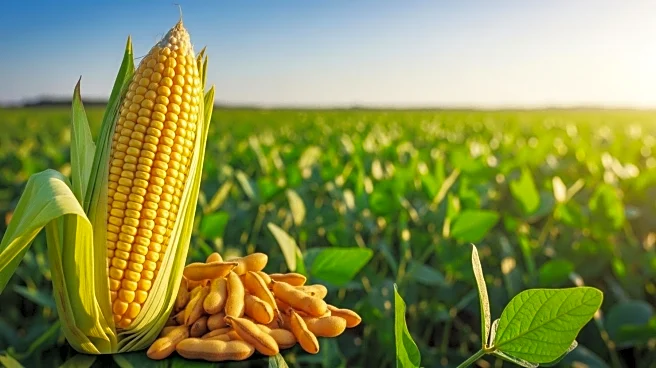What is the story about?
What's Happening?
Arkansas Governor Sarah Huckabee Sanders announced that two Taiwanese agricultural industry groups have signed letters of intent to purchase significant quantities of corn and soybeans from Arkansas and other U.S. suppliers. The Taiwan Feed Industry has committed to buying 8.5 million metric tons of corn and corn products, while the Taiwan Vegetable Oil Manufacturers Association plans to purchase 6.5 metric tons of soybeans. This agreement, spanning from 2025 to 2029, is valued at a minimum of $5.56 billion. The announcement comes at a challenging time for Arkansas's agricultural sector, which is experiencing depressed crop commodity prices, adverse weather conditions, and tariffs from the Trump administration. Experts warn that without further assistance, a significant portion of Arkansas farms could face closure.
Why It's Important?
This commitment from Taiwanese groups is crucial for Arkansas's agricultural industry, which is currently facing economic strain. The purchase agreement provides a much-needed boost to local farmers, potentially preventing the closure of many farms. The deal also highlights the importance of international trade relationships in supporting U.S. agriculture. With Taiwan being one of the largest markets for American agricultural products, this agreement reinforces the economic ties between the two regions. The potential federal relief efforts, as mentioned by U.S. Senator John Boozman, could further stabilize the industry, ensuring the sustainability of Arkansas's farming sector.
What's Next?
The next steps involve the negotiation of final prices by the importers, which will determine the actual financial impact of the agreement. Additionally, Arkansas's agricultural leaders and policymakers may continue to seek federal relief to support local farmers. The ongoing trade relationship with Taiwan could lead to further agreements, potentially expanding the market for Arkansas's agricultural products. Stakeholders will likely monitor the situation closely to ensure the commitments are fulfilled and to address any emerging challenges in the agricultural sector.
Beyond the Headlines
The agreement with Taiwanese groups may have broader implications for U.S. agricultural policy and international trade strategies. It underscores the need for diversified markets to mitigate risks associated with domestic economic challenges and international trade tensions. The deal could also influence future negotiations with other countries, setting a precedent for large-scale agricultural purchases. Additionally, the focus on international trade may prompt discussions on improving infrastructure and logistics to support increased export activities.















